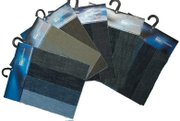Turkish Denim Mill Sets Sights on Premium Market
As designers crowd the flourishing premium denim market in California, textile suppliers are chasing them. One of the companies vying for a bigger chunk of business is Turkey’s Isko Textiles Inc.
Founded in 1983, Isko is one of a dozen companies owned by the Sanko Group in fields as disparate as petrochemicals, insurance and fabrics. In the two decades following its founding, Isko started offering stretch denim, producing corduroy fabric and providing materials for Levi Strauss & Co.’s European business.
Isko presently produces 115 million yards a year at its mill in Inegol, Turkey, which is roughly 100 miles southeast of Istanbul. The company aims to increase its annual capacity to 220 million yards in 2006. It built a 200,000- square-foot factory adjacent to the mill, which has the capacity to finish up to 200,000 garments a week. Isko also manufactures its own yarn.
“Obviously, that huge expansion necessitates the U.S. market,” said Bill Southworth, Isko’s national sales manager in Greensboro, N.C., noting that 98 percent of the mill’s production has been for European customers, including Diesel, G-Star and Hennes & Mauritz AB’s H&M stores.
Isko faces formidable competition from textile suppliers from Japan, Italy and the United States. Greensboro-based Cone Denim, the world’s largest denim producer and Southworth’s previous employer, has been making a concerted effort to woo companies such as Serfontaine, Volcom and Stronghold.
Relatively unknown domestically, Isko also must prove that its quality can justify its price. Southworth said Isko’s denim costs $4 to $6 a yard, excluding shipping. In comparison, Japan’s Kurabo Industries Ltd., which was founded in 1888 as a spinning company and is a leading supplier to denim designers, charges $5.50 to $8 a yard for its fabric made in Japan and $3 to $4 a yard for that made in China.
Isko also must compete in the race to find shuttle looms that can produce the muchcoveted selvage denim, the cloth used by jeans designers who aim for an authentic look. “I think it’s like finding a needle in the haystack right now,” Southworth said. Southworth said that although Isko provides some selvage for Levi’s European arm, that quantity is “teeny tiny.” Barry Reinstein, who oversees Isko’s sales in the Western United States out of Los Angeles, said Isko can be innovative with its finishes and dyes.
It is too early to tell whether Isko will match the volume and business it has in Europe. The company seems eager to meet American customers’ needs. “We will look to develop a unique pricing structure through product development,” Southworth said, listing possibilities such as a mock ring-spun yarn that resembles ring-spun yarn but costs less.
He said Isko’s current customers in the United States include Limited Brands Inc.’s Express brand and Gap Inc. and its Banana Republic unit. He also said Isko is building a distribution center next to the Inegol mill so that it can ship anywhere. A shipment from Turkey to the Eastern United States takes approximately 13 to 15 days, whereas a delivery to the West Coast takes 30 days.
Reinstein has been making the rounds to more than a dozen apparel companies in Southern California since he started working for Isko in December, taking sample orders or providing swatches to Hurley International, True Religion, Bebe and others.
Isabelle Looper, denim designer at Chip & Pepper, recently requested samples from Isko. “For us, it’s the quality and how the denim looks,” she said, explaining how the Vernon, Calif.–based company selects its materials.
She said the supply of fabrics is split approximately 50-50 between imports from Italy and Japan and domestic textiles from Cone Denim. Looper said that if Chip & Pepper were to choose Isko as a supplier, the earliest collection that would feature the Turkish denim would bow in Spring 2006.






















